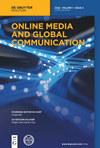Co-writing journalism on TikTok: media legitimacy and edutainment communities
引用次数: 0
Abstract
Abstract By combining traditional practices and the codes of TikTok, news media on TikTok provide journalistic news targeting in particular the so-called “Generation Z.” Short and often playful videos represent a new journalistic discourse that links journalistic information to TikTok culture. With the emergence of journalism on TikTok, news media have to negotiate and justify their authority on this digital social network and have to explain how journalism works. Journalists on TikTok are thus also providing media education, by showing manifestations of journalism or by justifying that the newspapers deserve to be TikTok-certified. Media adapt the content and the nature of their videos to TikTok, for example, by participating in viral trends, by publishing videos that affect the lives of young Internet users, or by telling information with a humorous angle. Through the different ways of interacting, media manage to include Internet users in the news production and to show the media community.在TikTok上共同撰写新闻:媒体合法性和教育娱乐社区
通过结合传统做法和TikTok的代码,TikTok上的新闻媒体提供了新闻新闻,特别是针对所谓的“z世代”,短而有趣的视频代表了一种新的新闻话语,将新闻信息与TikTok文化联系起来。随着TikTok上新闻的出现,新闻媒体必须与这个数字社交网络进行谈判,并证明自己的权威,还必须解释新闻是如何运作的。因此,TikTok上的记者也在提供媒体教育,通过展示新闻表现或证明报纸应该获得TikTok认证。媒体根据抖音调整视频的内容和性质,例如,参与病毒式传播趋势,发布影响年轻互联网用户生活的视频,或者以幽默的角度讲述信息。媒体通过不同的互动方式,设法将互联网用户纳入新闻生产,并展示媒体社区。
本文章由计算机程序翻译,如有差异,请以英文原文为准。
求助全文
约1分钟内获得全文
求助全文
来源期刊

Online Media and Global Communication
Communication, Media Studies, Internet Studies, International Studies, International Relations-
自引率
0.00%
发文量
0
期刊介绍:
Online Media and Global Communication (OMGC) is a new venue for high quality articles on theories and methods about the role of online media in global communication. This journal is sponsored by the Center for Global Public Opinion Research of China and School of Journalism and Communication, Shanghai International Studies University, China. It is published solely online in English. The journal aims to serve as an academic bridge in the research of online media and global communication between the dominating English-speaking world and the non-English speaking world that has remained mostly invisible due to language barriers. Through its structured abstracts for all research articles and uniform keyword system in the United Nations’ official six languages plus Japanese and German (Arabic, Chinese, English, French, Russian, Spanish, Japanese, and German), the journal provides a highly accessible platform to users worldwide. Its unique dual track single-blind and double-blind review system facilitates manuscript reviews with different levels of author identities. OMGC publishes review essays on the state-of-the-art in online media and global communication research in different countries and regions, original research papers on topics related online media and global communication and translated articles from non-English speaking Global South. It strives to be a leading platform for scientific exchange in online media and global communication.
For events and more, consider following us on Twitter at https://twitter.com/OMGCJOURNAL.
Topics
OMGC publishes high quality, innovative and original research on global communication especially in the use of global online media platforms such as Facebook, TikTok, YouTube, Twitter, Instagram, WhatsApp, Weibo, WeChat, Wikipedia, web sites, blogs, etc. This journal will address the contemporary concerns about the effects and operations of global digital media platforms on international relations, international public opinion, fake news and propaganda dissemination, diaspora communication, consumer behavior as well as the balance of voices in the world. Comparative research across countries are particularly welcome. Empirical research is preferred over conceptual papers.
Article Formats
In addition to the standard research article format, the Journal includes the following formats:
● One translation paper selected from Non-English Journals that with high quality as “Gems from the Global South” per issue
● One review essay on current state of research in online media and global communication in a country or region
 求助内容:
求助内容: 应助结果提醒方式:
应助结果提醒方式:


